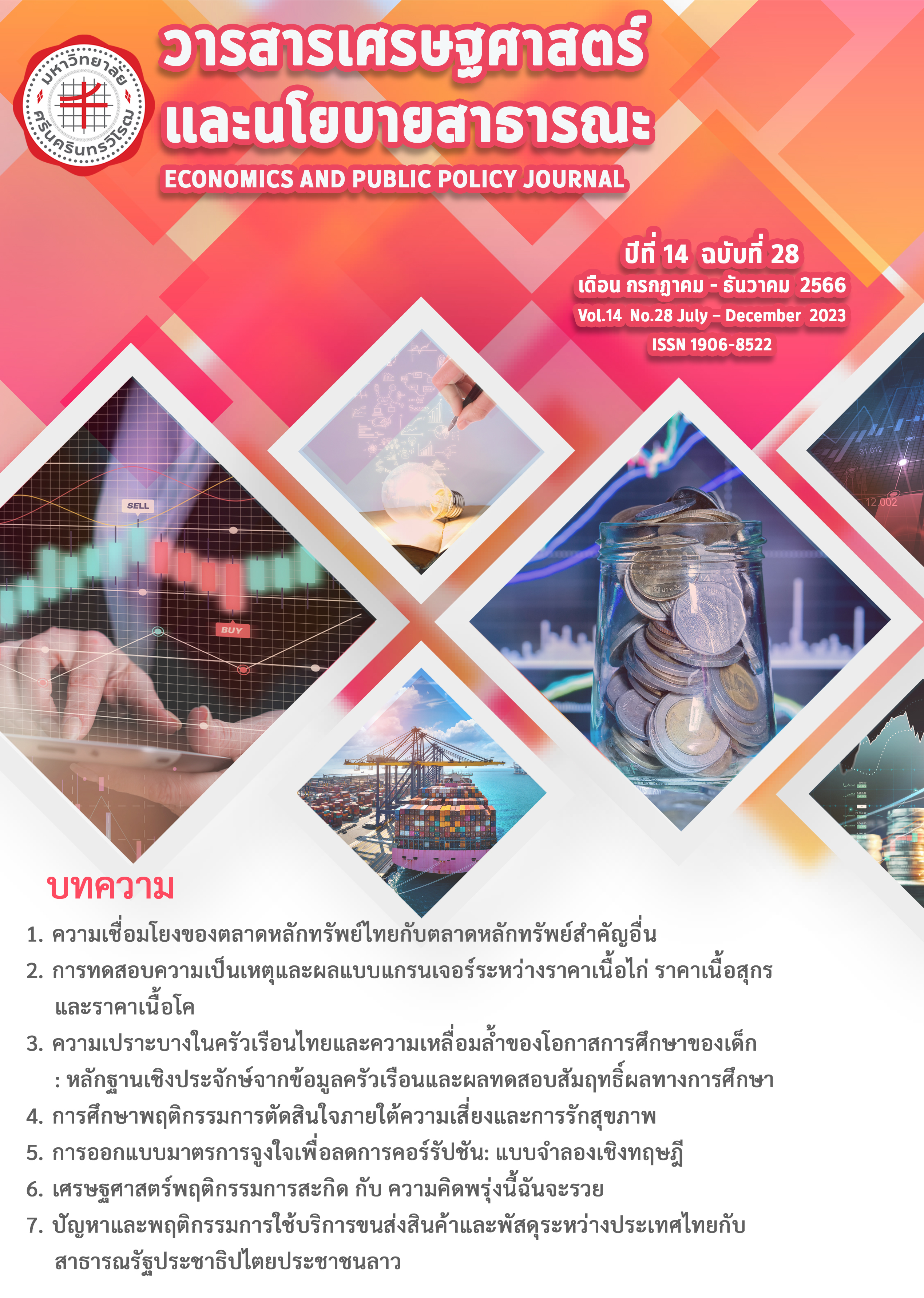การออกแบบมาตรการจูงใจเพื่อลดการคอร์รัปชัน: แบบจำลองเชิงทฤษฎี
Main Article Content
บทคัดย่อ
มูลเหตุสำคัญประการหนึ่งของปัญหาการคอร์รัปชันในหน่วยงานราชการเป็นผลมาจากปัญหาคุณธรรม-วิบัติ (moral hazard) เนื่องจากข้อมูลข่าวสารไม่สมมาตร (asymmetric information) ภายหลังจากที่มีการตกลงทำสัญญามอบหมายงาน โดยฝ่ายผู้บังคับบัญชาหรือเจ้านายขาดข้อมูลข่าวสารอย่างเพียงพอในการตรวจตรา
การปฏิบัติหน้าที่ของเจ้าหน้าที่รัฐระดับปฏิบัติงาน เปิดโอกาสให้เกิดการแสวงหาผลประโยชน์ส่วนตน (personal gain) ด้วยการทุจริตต่อหน้าที่ สำหรับการออกแบบกลไกเชิงนโยบายเพื่อแก้ปัญหาคอร์รัปชันนั้น ในการศึกษานี้ได้ใช้กรอบแนวคิดภายใต้แบบจำลองเจ้านายกับลูกน้อง (Principal-Agent Model) โดยการวิเคราะห์มาตรการแรงจูงใจ (incentive measure) ที่ช่วยลดพฤติกรรมการคอร์รัปชันของเจ้าหน้าที่รัฐระดับปฏิบัติงาน สำหรับผลของการวิเคราะห์แบบจำลองในงานศึกษานี้ พบว่าเจ้าหน้าที่รัฐมิได้มีหลักประกันใด ๆ ที่จะช่วยสร้างความมั่นใจได้ว่า จะได้รับผลตอบแทนที่คุ้มค่าหากปฏิบัติหน้าที่ด้วยความซื่อสัตย์สุจริต ดังนั้น แนวทางหนึ่งในการแก้ปัญหา
ดังกล่าวคือการให้หลักประกันขั้นต่ำ (limited liability) เพื่อจูงใจให้ซื่อสัตย์ โดยใช้ดัชนีความซื่อสัตย์เป็นเกณฑ์ในการพิจารณาเลื่อนตำแหน่งของทางราชการ
Article Details

อนุญาตภายใต้เงื่อนไข Creative Commons Attribution-NonCommercial-NoDerivatives 4.0 International License.
สงวนลิขสิทธิ์ © 2553 คณะเศรษฐศาสตร์ มหาวิทยาลัยศรีนครินทรวิโรฒ
คณะเศรษฐศาสตร์ มหาวิทยาลัยศรีนครินทรวิโรฒ จัดพิมพ์วารสารเศรษฐศาสตร์และนโยบายสาธารณะ เพื่อเผยแพร่บทความวิชาการทางเศรษฐศาสตร์ นโยบายสารธารณะ และสาขาอื่นๆที่เกี่ยวข้อง ทัศนะและข้อคิดเห็นใดๆ ที่ปรากฏในวารสารเป็นความคิดเห็นส่วนตัวของผู้เขียน โดยบทความที่ได้รับการตอบรับจะถือเป็นลิขสิทธิ์ของคณะเศรษฐศาสตร์ มหาวิทยาลัยศรีนครินทรวิโรฒ
บรรณาธิการ อาจารย์ ดร.พลพัธน์ โคตรจรัส
เอกสารอ้างอิง
Abbink, K., Irlenbusch, B., & Renner, E. (2002). An experimental bribery game. Journal of Law, economics, and organization, 18(2),
-454.
Aidt, T. S. (2003). Economic analysis of corruption: a survey. The Economic Journal, 113(491), F632-F652.
Aidt, T. S. (2016). Rent seeking and the economics of corruption. Constitutional Political Economy, 27, 142-157.
Akerlof, G. A. (1982). Labor contracts as partial gift exchange. The quarterly journal of economics, 97(4), 543-569.
Armantier, O., & Boly, A. (2011). A controlled field experiment on corruption. European Economic Review, 55(8), 1072-1082.
Barassi, M. R., & Zhou, Y. (2012). The effect of corruption on FDI: A parametric and non-parametric analysis. European Journal of
Political Economy, 28(3), 302-312.
Barr, A., & Serra, D. (2010). Corruption and culture: An experimental analysis. Journal of Public economics, 94(11-12), 862-869.
Becker, G. S. (1968). Crime and punishment: An economic approach. Journal of political economy, 76(2), 169-217.
Becker, G. S., & Stigler, G. J. (1974). Law enforcement, malfeasance, and compensation of enforcers. The Journal of Legal Studies, 3(1),
-18.
Burguet, R., Ganuza, J. J., & Montalvo, J. G. (2018). The microeconomics of corruption. Handbook of Game Theory and Industrial
Organization, Volume II, 420-450.
Ferraz, C., & Finan, F. (2009). Motivating politicians: The impacts of monetary incentives on quality and performance (No. w14906).
National Bureau of Economic Research.
Frank, B., Lambsdorff, J. G., & Boehm, F. (2011). Gender and corruption: Lessons from laboratory corruption experiments. The European
Journal of Development Research, 23, 59-71.
Gagliarducci, S., & Nannicini, T. (2013). Do better paid politicians perform better? Disentangling incentives from selection. Journal of the
European Economic Association, 11(2), 369-398.
Goel, R. K., & Rich, D. P. (1989). On the economic incentives for taking bribes. Public choice, 61(3), 269-275.
Khan, M. H. (2005). Markets, states and democracy: Patron–client networks and the case for democracy in developing countries.
Democratisation, 12(5), 704-724.
Laffont, J.-J., & Martimort, D. (2009). The Theory of Incentives: The Principal-Agent Model. Princeton University Press.
Lambert‐Mogiliansky, A., Majumdar, M., & Radner, R. (2008). Petty corruption: A game‐theoretic approach. International Journal of
Economic Theory, 4(2), 273-297.
Lambsdorff, J. G. (2012). Behavioral and experimental economics as a guidance to anticorruption. In New advances in experimental
research on corruption (Vol. 15, pp. 279-300). Emerald Group Publishing Limited.
Lambsdorff, J. G. (2002). Corruption and rent-seeking. Public choice, 113(1-2), 97-125.
Mo, P. H. (2001). Corruption and economic growth. Journal of comparative economics, 29(1), 66-79.
Merry, S., Davis, K., & Kingsbury, B. (Eds.). (2015). The Quiet Power of Indicators: Measuring Governance, Corruption, and Rule of Law
(Cambridge Studies in Law and Society). Cambridge: Cambridge University Press.
Myerson, R. B. (1993). Effectiveness of electoral systems for reducing government corruption: a game-theoretic analysis. Games and
economic behavior, 5(1), 118-132.
Olken, B. A. (2007). Monitoring corruption: evidence from a field experiment in Indonesia. Journal of political Economy, 115(2), 200-249.
Peltier-Rivest, D. (2018). A model for preventing corruption. Journal of Financial Crime, 25(2), 545-561.
Policardo, L., & Carrera, E. J. S. (2018). Corruption causes inequality, or is it the other way around? An empirical investigation for a panel
of countries. Economic Analysis and Policy, 59, 92-102.
Prasertsri, L. (2021). Essays on Anti-corruption Policy and Online Customer Reviews (Doctoral dissertation, University of East Anglia,
Faculty of Social Sciences, School of Economics).
Rose-Ackerman, S. (1997). Corruption, inefficiency and economic growth. Nordic Journal of Political Economy, 24(1), 3-20.
Rose-Ackerman, S. (1999). Corruption and Government: Causes, Consequences, and Reform. Cambridge University Press.
Rose-Ackerman, S., & Palifka, B. J. (2016). Corruption and government: Causes, consequences, and reform. Cambridge university press.
Shleifer, A., & Vishny, R. W. (1993). Corruption. The quarterly journal of economics, 108(3), 599-617.
Van Rijckeghem, C., & Weder, B. (2001). Bureaucratic corruption and the rate of temptation: do wages in the civil service affect
corruption, and by how much?. Journal of development economics, 65(2), 307-331.
Van Veldhuizen, R. (2013). The influence of wages on public officials’ corruptibility: A laboratory investigation. Journal of economic
psychology, 39, 341-356.
Yoo, S. H. (2008). Petty corruption. Economic Theory, 37, 267-280.


